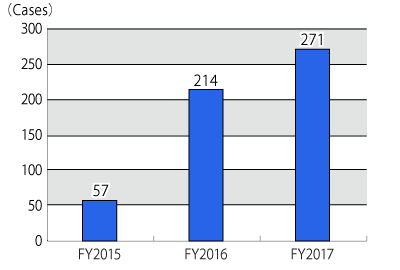New private lodging business rules have been introduced! Before booking private lodging, confirm the total charges and cancellation policy.
Local consumer affairs centers and similar organizations across Japan have received more and more inquiries about private lodging: 57 cases in FY2015, 214 cases in FY2016, and 271 cases in FY2017. These inquiries are roughly divided into three types: those related to use of private lodging (e.g. "When I cancelled, I was charged the full amount for accommodation booked as a cancellation fee"), those related to private lodging business (e.g. "I bought a manual on private lodging business after being told that the business would be profitable. On second thought, I don't think it will be profitable and I want to cancel the contract"), and complaints from the neighborhood (e.g. "It's too noisy", "Garbage was not properly sorted out").
On June 15, 2018, the Private Lodging Business Act took effect. Private lodging business operators registered under the new act are entitled to operate private lodging business based on certain rules.
Therefore, NCAC decided to introduce some inquiries about private lodging and encourage consumers to confirm the total charges for accommodation, the cancellation policy, how to receive a key, etc. before booking private lodging.
Diagram: Number of inquiries about private lodging1 received by PIO-NET2
The annual number of inquiries was 57 in FY2015, 214 in FY2016, and 271 in FY2017.
- 1 Cases where an inquiry included a word of "Minpaku" (Japanese word for private lodging) were counted. They include inquiries about use of private lodging and those about private lodging business.
- 2 PIO-NET is a database that collects information on inquiries concerning consumer affairs by linking NCAC with local consumer affairs centers and similar organizations across Japan via an online network. In FY2018, 33 inquiries were received till May 31, 2018. The above data do not include inquiries referred to NCAC by local consumer affairs centers, etc.
Sample cases of inquiries and complaints
Inquiries about use of private lodging
- [Case1]
- When I cancelled private lodging, I was charged the full amount for accommodation booked as a cancellation fee.
- [Case2]
- I was charged a cleaning fee in addition to lodging charges. The total amount for accommodation was not clearly written on the booking website.
- [Case3]
- I was unable to stay at a private lodging apartment due to unavailability to contact the apartment owner on the day of stay. However, I was charged for lodging.
Inquiries about private lodging business and complaints from the neighborhood
- [Case4]
- I was told that it was easy to make money from private lodging business and was induced to buy an expensive manual.
- [Case5]
- Complaints from the neighborhood around a private lodging apartment
Problems highlighted by the sampling of inquiries and complaints
- Description on web pages of some private lodging agents is insufficient or unclear.
- Private lodging business operators may not provide sufficient services.
- Some consumers were told that it would be easy to make money from private lodging business.
- Complaints from neighbors around private lodging facilities were not smoothly solved.
Advice for consumers
- Before booking private lodging, check if the facility has been registered under the Private Lodging Business Act.
- Carefully confirm the total charges for accommodation, cancellation policy, etc.
- Confirm how to receive a key beforehand. When arriving at a rental, check cleanliness inside.
- Don't be taken in by a sales talk like "It's easy to make money from private lodging business".
- Neighbors around a private lodging house should know a contact for complaints.
- In case of trouble, consult your local consumer affairs center.
